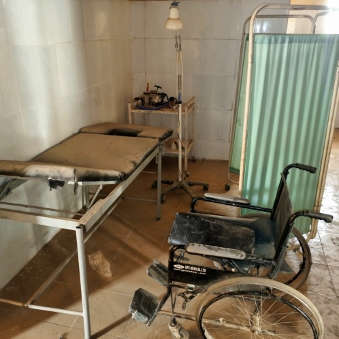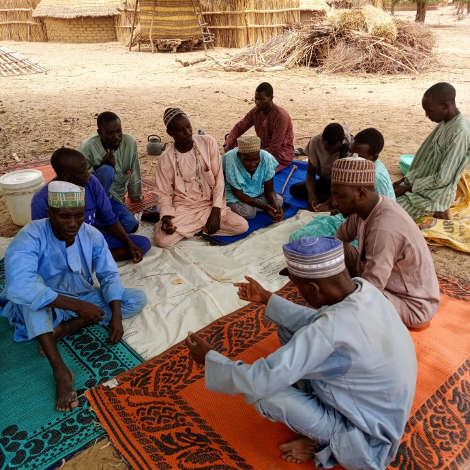As report by Nigeria Info, in Kano, more than a few rural communities bear witness to the dreams of young lives and the hopes of new mothers being extinguished by the scourge of maternal mortality.
On the eve of this reporter’s visit to Unguwarbai community in Ajingi Local Government Area (LGA) of Kano State, a 20-year-old Kamilu Samaina had lost her life in a tragic childbirth ordeal.
Samaina endured a 15-hour home labor under a Traditional Birth Attendant (TBA’s) care, only to succumb to postpartum hemorrhage after several delays in receiving adequate medical attention.
“The baby survived, but Samaina began to bleed heavily,” her brother, Idris Musa, said.
Postpartum hemorrhage (PPH), also known as heavy bleeding after giving birth, is a serious but treatable complication that can be life-threatening if not treated quickly by a doctor or nurse.
Samaina’s family became afraid and desperate for additional medical attention as the TBA couldn’t stop the heavy bleeding. It took the family two frantic hours before getting a car to take her to Ajingi Cottage facility, which was 15 kilometers away.
Once there, she had to endure another two-hour wait before being attended to, only to be referred to another hospital, Gaya General Hospital.
It took them another hour to secure a good transportation. The delay proved fatal. Kamilu Samaina died in her brother’s arms, few steps from the car that was meant to convey her to Gaya.
“We took her to Habiba Kongoma’s house (TBA) when she was not feeling fine. Kongoma gave her some herbs, which she took three times daily. She later gave birth after 15 hours of labor. The baby is alive and healthy, but she started bleeding. We spent two hours before getting a car to carry her to the Ajingi Cottage facility. We spent another two hours before they attended to us, and they later referred us to Gaya General Hospital.
“We spent another hour before getting a car to take us to Gaya hospital; we were carrying her to the car stand when she died in our hands,” Idris Musa recounted the harrowing experience with a sad face.
A month barely passes without a heartbreaking update from Gurduba and Unguwarbai communities in Ajingi LGA. Pregnant women in these communities frequently die during or after childbirth, according to Yakubu Makama, chairman of the Gurduba Ward Development Committee (WDC).
“We’ve lost many lives; at least one pregnant woman dies every month, and sometimes we record two or three deaths in a month,” Makama said.
Despite the presence of a health post in Samaina’s community, and a fully equipped 12-year-old Primary Healthcare Centre (PHC) in Gurduba, high maternal mortality rates persist.
The Gurduba PHC is part of the federal government’s Basic Health Care Provision Fund (BHCPF) program but remains largely ineffective due to staffing issues.
“The facility has labor rooms, a laboratory, pharmacy, male and female wards, consulting rooms, a pediatric ward, waiting rooms, wheelchairs, a standby generator, air conditioners, and staff accommodation, but no staff to take delivery,” Makama said.

Makama also disclosed that a midwife hired by WDC members to work at the Gurduba PHC three years ago was fired by the Kano State Primary Health Care Management Board (KSPHCMB) a year later.
“With the coming of the BHCPF, we were able to employ Sheba Musa, a midwife, after nine years without one. She started taking child deliveries daily, but the Kano State Primary Health Care Management Board stopped her. We later wrote several letters to the board for her replacement without a single response.”
Suleiman Sabin, Officer-in-Charge of Gurduba PHC, corroborated Makama’s statement. Sabin, a trained Community Health Extension Worker (CHEW), disclosed that gender barriers further complicate the situation.
“I am a trained CHEW and currently studying Public Health at the university. I have taken countless deliveries in the past, but being a man, pregnant women in this area refuse my help due to religious and cultural beliefs,” he said.
Despite initiatives like the BHCPF aimed at addressing maternal mortality in Kano, the state still contributes significantly to the national statistics on maternal deaths in Nigeria. Findings by this newspaper reveal that the increasing reliance on TBAs in rural and hard-to-reach areas due to limited access to skilled healthcare providers, standard maternal and child health services, and religious and cultural beliefs are responsible for a substantial proportion of these tragic deaths.
How TBAs contribute to maternal deaths in Kano
Infant and maternal deaths in Kano are alarmingly high, ranking among the worst in the country. In 2022, the state government reported a maternal mortality rate of 1,025 deaths per 100,000 live births. Additionally, a Nigeria Health Watch report in 2020 revealed that only 21.5 percent, approximately two out of ten, of deliveries in Kano State are attended by skilled birth attendants. Another report by the Development Research and Project Center (DRPC), titled “Kano State Health Indices,” reveals that less than 50 percent of the urban population and less than 40 percent of the rural population have access to healthcare services.
Due to these significant gaps, residents particularly those in rural areas increasingly seek alternative measures, including Traditional Birth Attendants (TBAs). In Kano, TBAs typically lack formal medical training and their knowledge is often based on traditional practices passed down through generations, which may not align with modern medical standards. While their services are often inexpensive, this gap in knowledge often leads to the mismanagement of complications during pregnancy and childbirth, significantly contributing to poor maternal outcomes.
To continue reading, click here


